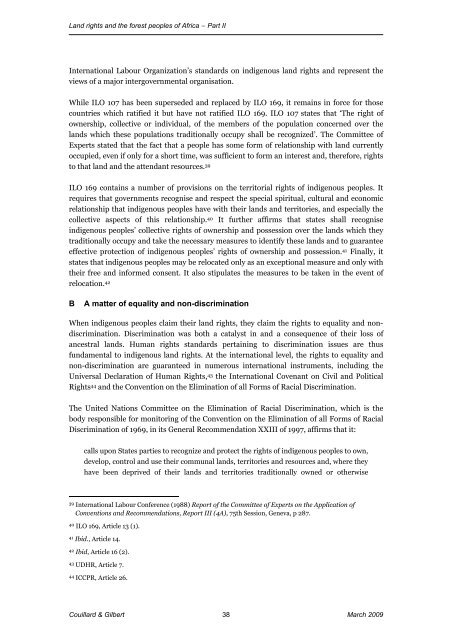Land Rights and the Forest Peoples of Africa
Land Rights and the Forest Peoples of Africa
Land Rights and the Forest Peoples of Africa
You also want an ePaper? Increase the reach of your titles
YUMPU automatically turns print PDFs into web optimized ePapers that Google loves.
<strong>L<strong>and</strong></strong> rights <strong>and</strong> <strong>the</strong> forest peoples <strong>of</strong> <strong>Africa</strong> – Part II<br />
International Labour Organization’s st<strong>and</strong>ards on indigenous l<strong>and</strong> rights <strong>and</strong> represent <strong>the</strong><br />
views <strong>of</strong> a major intergovernmental organisation.<br />
While ILO 107 has been superseded <strong>and</strong> replaced by ILO 169, it remains in force for those<br />
countries which ratified it but have not ratified ILO 169. ILO 107 states that ‘The right <strong>of</strong><br />
ownership, collective or individual, <strong>of</strong> <strong>the</strong> members <strong>of</strong> <strong>the</strong> population concerned over <strong>the</strong><br />
l<strong>and</strong>s which <strong>the</strong>se populations traditionally occupy shall be recognized’. The Committee <strong>of</strong><br />
Experts stated that <strong>the</strong> fact that a people has some form <strong>of</strong> relationship with l<strong>and</strong> currently<br />
occupied, even if only for a short time, was sufficient to form an interest <strong>and</strong>, <strong>the</strong>refore, rights<br />
to that l<strong>and</strong> <strong>and</strong> <strong>the</strong> attendant resources. 39<br />
ILO 169 contains a number <strong>of</strong> provisions on <strong>the</strong> territorial rights <strong>of</strong> indigenous peoples. It<br />
requires that governments recognise <strong>and</strong> respect <strong>the</strong> special spiritual, cultural <strong>and</strong> economic<br />
relationship that indigenous peoples have with <strong>the</strong>ir l<strong>and</strong>s <strong>and</strong> territories, <strong>and</strong> especially <strong>the</strong><br />
collective aspects <strong>of</strong> this relationship. 40 It fur<strong>the</strong>r affirms that states shall recognise<br />
indigenous peoples’ collective rights <strong>of</strong> ownership <strong>and</strong> possession over <strong>the</strong> l<strong>and</strong>s which <strong>the</strong>y<br />
traditionally occupy <strong>and</strong> take <strong>the</strong> necessary measures to identify <strong>the</strong>se l<strong>and</strong>s <strong>and</strong> to guarantee<br />
effective protection <strong>of</strong> indigenous peoples’ rights <strong>of</strong> ownership <strong>and</strong> possession. 41 Finally, it<br />
states that indigenous peoples may be relocated only as an exceptional measure <strong>and</strong> only with<br />
<strong>the</strong>ir free <strong>and</strong> informed consent. It also stipulates <strong>the</strong> measures to be taken in <strong>the</strong> event <strong>of</strong><br />
relocation. 42<br />
B<br />
A matter <strong>of</strong> equality <strong>and</strong> non-discrimination<br />
When indigenous peoples claim <strong>the</strong>ir l<strong>and</strong> rights, <strong>the</strong>y claim <strong>the</strong> rights to equality <strong>and</strong> nondiscrimination.<br />
Discrimination was both a catalyst in <strong>and</strong> a consequence <strong>of</strong> <strong>the</strong>ir loss <strong>of</strong><br />
ancestral l<strong>and</strong>s. Human rights st<strong>and</strong>ards pertaining to discrimination issues are thus<br />
fundamental to indigenous l<strong>and</strong> rights. At <strong>the</strong> international level, <strong>the</strong> rights to equality <strong>and</strong><br />
non-discrimination are guaranteed in numerous international instruments, including <strong>the</strong><br />
Universal Declaration <strong>of</strong> Human <strong>Rights</strong>, 43 <strong>the</strong> International Covenant on Civil <strong>and</strong> Political<br />
<strong>Rights</strong> 44 <strong>and</strong> <strong>the</strong> Convention on <strong>the</strong> Elimination <strong>of</strong> all Forms <strong>of</strong> Racial Discrimination.<br />
The United Nations Committee on <strong>the</strong> Elimination <strong>of</strong> Racial Discrimination, which is <strong>the</strong><br />
body responsible for monitoring <strong>of</strong> <strong>the</strong> Convention on <strong>the</strong> Elimination <strong>of</strong> all Forms <strong>of</strong> Racial<br />
Discrimination <strong>of</strong> 1969, in its General Recommendation XXIII <strong>of</strong> 1997, affirms that it:<br />
calls upon States parties to recognize <strong>and</strong> protect <strong>the</strong> rights <strong>of</strong> indigenous peoples to own,<br />
develop, control <strong>and</strong> use <strong>the</strong>ir communal l<strong>and</strong>s, territories <strong>and</strong> resources <strong>and</strong>, where <strong>the</strong>y<br />
have been deprived <strong>of</strong> <strong>the</strong>ir l<strong>and</strong>s <strong>and</strong> territories traditionally owned or o<strong>the</strong>rwise<br />
39<br />
International Labour Conference (1988) Report <strong>of</strong> <strong>the</strong> Committee <strong>of</strong> Experts on <strong>the</strong> Application <strong>of</strong><br />
Conventions <strong>and</strong> Recommendations, Report III (4A), 75th Session, Geneva, p 287.<br />
40<br />
ILO 169, Article 13 (1).<br />
41<br />
Ibid., Article 14.<br />
42<br />
Ibid, Article 16 (2).<br />
43<br />
UDHR, Article 7.<br />
44<br />
ICCPR, Article 26.<br />
Couillard & Gilbert 38<br />
March 2009





